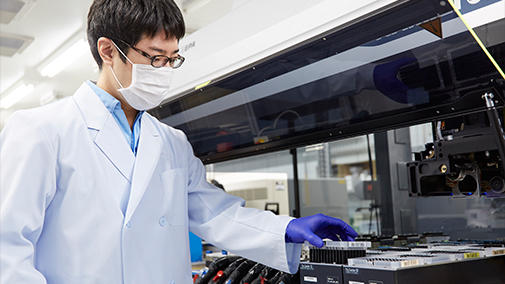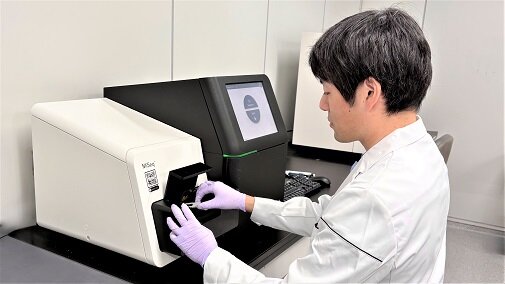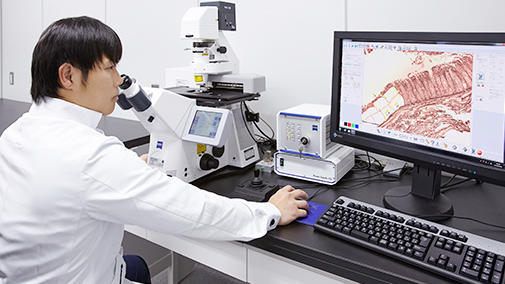Basic Research Department
Supporting Proprietary Research and Development at its Foundation
The Basic Research Department works to scientifically verify the concept that “a healthy intestinal tract leads to a long life”
by elucidating the relation between intestinal bacteria and the physiology of the host.
It also supports Yakult’s proprietary research and development at its foundation
by clarifying the value of product ingredients in terms of their contribution to preventive medicine.

Research areas
- Exploring the ecology of intestinal microbiota and the influence of constituent bacteria on the host health
- Clarifying the influence of intestinal microbiota on the host's immune function, digestive tract physiology, neurotransmission and endocrine system
- Verification of the effectiveness of our products
From the Intestinal Tract to the Entire Body: the Connection between the Intestinal Microbiota and the Health of the Host
The Basic Research Department fulfills its role of supporting the foundation of probiotic research by scientifically verifying the effect that microbes inhabiting the intestines have on the human body. The human intestinal tract has approximately 1,000 different species of bacteria inhabiting it, forming a mass called the intestinal microbiota which has a variety of physiological effects on the host. Research on intestinal microbiota has rapidly expanded on an international scale in recent years and it is becoming clear that the influence of the intestinal microbiota on the host is not limited to intestinal diseases, but also include lifestyle diseases, such as cancer, and mental wellbeing.
The Basic Research Department uses a variety of methods such as the latest genetic analysis and intestinal bacteria isolation technology to discover how the type and composition of intestinal bacteria are connected to illness onset and elucidate the functions of intestinal microbiota, including the effects on host health, from the perspective of preventive medicine.


Scientific Verification of "a Healthy Intestinal Tract Leads to a Long Life"
The intestine is also called the "second brain" because it possesses a network of nerves that can function without signals from the brain. In addition, the intestines have their own immune system because they are exposed to the external environment. Indeed, the intestines play an important role in maintaining human life.
We believe that clarifying the complex relations within the intestinal microbiota and probiotics within this clever system will lead to the scientific verification that a healthy intestinal tract truly leads to a long life.
The elucidation of the beneficial actions that Yakult's probiotic Lacticaseibacillus paracasei strain Shirota* has on the human body, as well as the mechanism of those actions, is an important research topic.
*This bacterium was previously classified as Lactobacillus casei strain Shirota
Basic Research Producing Value in Terms of Evidence-based Preventive Medicine
The Basic Research Department fuses Yakult's long years of research achievements with the latest life science to proactively work to present and demonstrate the latest, high-quality evidence for probiotics, including L. paracasei strain Shirota and Bifidobacterium breve strain Yakult.
We work to produce a diverse range of new health value through investigations into the new possibilities of probiotics, such as L. paracasei strain Shirota's ability to help prevent infection, reduce stress, and reduce cancer risk, and the positive effects that B. breve strain Yakult and other bifidobacteria have on the intestinal environment.





